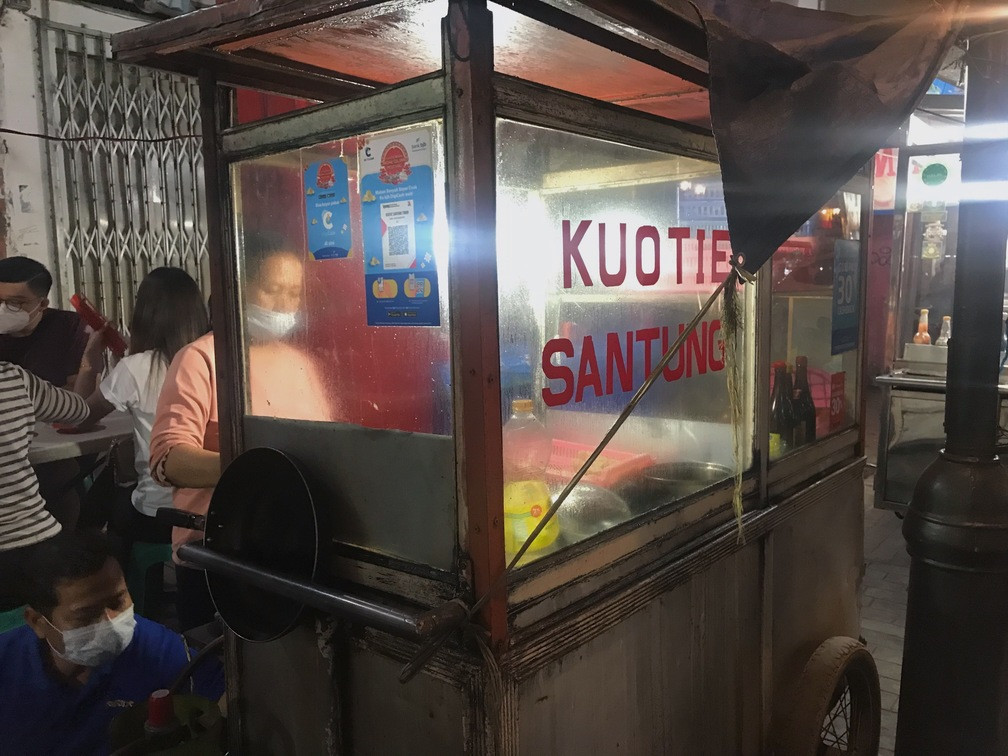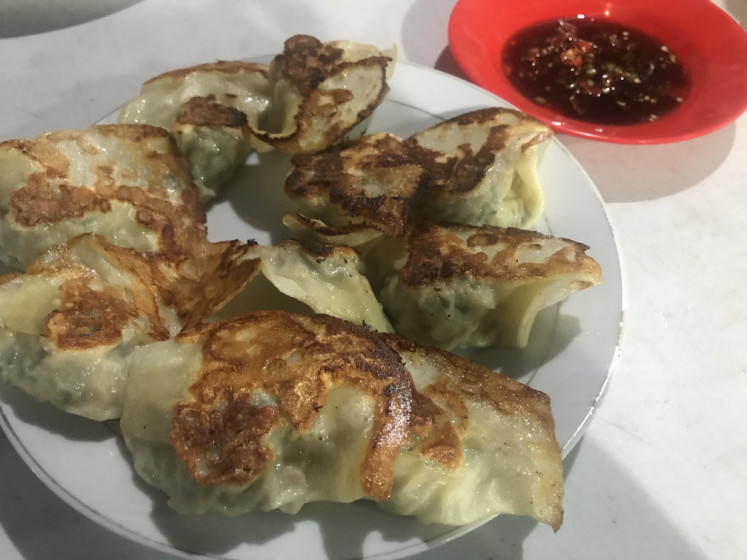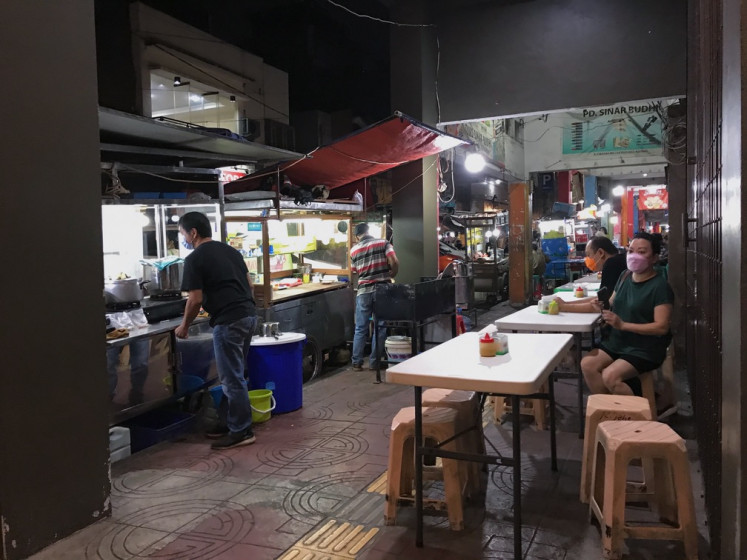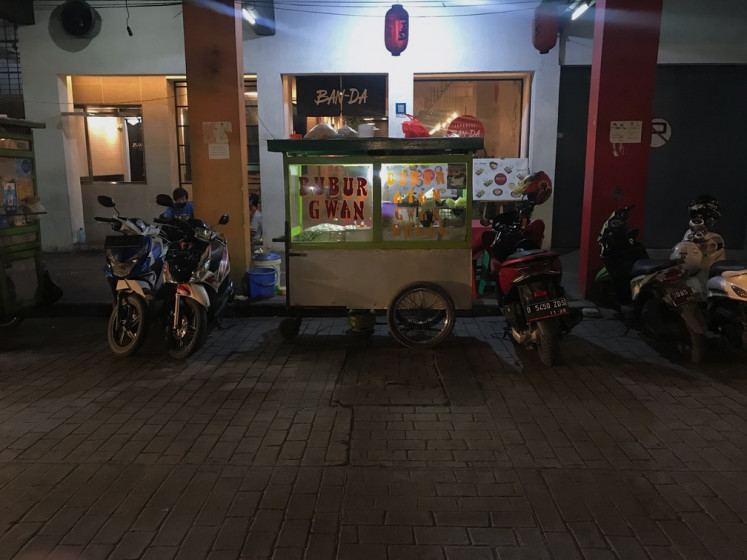Popular Reads
Top Results
Can't find what you're looking for?
View all search resultsPopular Reads
Top Results
Can't find what you're looking for?
View all search resultsIndonesian Icons: The street food haven of Cibadak
"Indonesian Icons" is a new column providing an in-depth focus on figures, elements and events that have defined the country, from noteworthy individuals and culinary delights to historic locales and indelible moments. In this edition, we focus on a staple in Bandung’s street food scene, Cibadak, an establishment that’s been dear to many Indonesians for decades.
Change text size
Gift Premium Articles
to Anyone
I
n the daytime, Cibadak seems like just another part of the busy Astanaanyar district in Bandung, West Java. Lined with old shophouses on both sides of the street, the city’s Chinatown possesses an “old town” kind of charm. The tile-clad buildings house shops of various kinds; from fireworks, toys and stationery to snacks and artificial flowers. Come sundown, when the shops close down, the area becomes a street food haven.
For both Bandungites and tourists, Cibadak is a reliable place to get supper or a late-night bite. The area is a melting pot of cultures, with a distinct Chinese-Indonesian influence on a large part of the vendors. Lining up the sidewalk are stalls that sell dishes like nasi campur (rice with assorted barbecued meats), noodles, soto (traditional soup), dim sum and satay. Most have been around for decades, occupying the same spot and serving generations of customers.
One of the oldest stalls is the famed Bola Obi Gardujati — serving deep-fried sweet potato balls — run by Yana, a 49-year-old man who inherited the business from his late father. His father started the business in 1969 in Dalem Kaum, another street across Cibadak. He first started taking over the business with his older brother when their father passed away in 1988.
Mouthwatering: Pan-fried "kuotie" (a variant of Chinese dumplings) served with a dip of soy sauce, black vinegar, sesame oil and chili. (JP/Almer Mikhail)
With recipes passed down from their parents, Yana and his brother continued the business until it expanded further. Today, Bola Obi Gardujati has 15 outlets all over Bandung. The business maintains a close family operation with family members taking on different roles, from providing ingredients and making the sweet potato balls to managing the stalls. The recognition also brought with it customers from various backgrounds.
“Last year, before the pandemic hit, Krisdayanti visited [the stall],” Yana recalled, referring to the renowned Indonesian singer.
Right beside Bola Obi Gardujati is Bubur Gwan, a chicken congee stall that’s been open since 2007. Managed by a Jakarta transplant Budi, 45, the stall serves savory congee with various sweet-marinated toppings such as shredded chicken, chicken liver and gizzard, and boiled egg. Much like Yana, Budi also inherited the recipe for his congee from his parents, reflecting that much of what Cibadak offers is rooted in tradition and legacy.
A place of memories
For graphic designer and entrepreneur Devika, 25, Cibadak is a place that holds personal memories. She often came to Cibadak after work with friends from her office when she interned in Bandung four years ago. To her, going to Cibadak means spending time with friends or family. Her favorite dishes include sekoteng (sweet ginger-based hot soup with various toppings) and wedang ronde, a Chinese-Indonesian take on tangyuan (hot dessert of glutinous rice balls filled with crushed peanuts in mild ginger broth).
Quieter during the pandemic: Rows of vendors in Cibadak, West Java, seen from the sidewalk. (JP/Almer Mikhail)“Some of the food I had there are difficult to find in Jakarta. Even if I did find a dish here, they’re not as good as the ones I had in Bandung,” she said.
Indeed, a lot of the stalls command tremendous loyalty from their customers, no matter where they come from. One such stall is Kuotie Santung Timur, a vendor solely selling kuotie, a variant of jiaozi (Chinese dumplings) that is pan-fried or deep-fried. The man behind the stall is Yusup, 45, from Cilacap, Central Java, who started his business in 1996, around the time street vendors from Astanaanyar were relocated to Cibadak.
“Aside from locals, a lot of my regulars come from Jakarta and East Java. I don’t actually know why this is,” Yusup said in between serving a group of customers from Semarang, Central Java, one of his many regulars from out of town.
The dish in question that keeps the customers coming back are plump dumplings filled with ground pork, shrimp, chives and other ingredients, served with a selection of dips. Yusup also makes a portion of halal variants of his kuotie with ground chicken, prepared and cooked separately to ensure they are good to consume for his Muslim customers.
Aside from the vendors, the area’s customers have also been coming there for a long time. Tax admin Cathlin, 22, who was having dinner with her friends, is one of them.
“On nights we don’t feel like going anywhere else, we often end up hanging out here,” she said.
She and her friends have been regulars of Cibadak since they were in high school. Now in their early 20s, they have dinners there as often as once a week, with Kuotie Santung and Soto Jakarta being their go-tos.
Some vendors wander the street from end to end, like onde-onde (boiled rice cake filled with palm sugar) seller Agus, who makes his rounds throughout the night whenever he feels like it. The cheery 61-year-old man is almost certain to give you an extra onde-onde whether you only buy one or a dozen. His presence, along with other vendors with their own unique characteristics, has shaped Cibadak into the warm community hub it is today.
A welcome growth
Asked about the changes the neighborhood has undergone throughout the decades, vendors and visitors alike said Cibadak had been getting more popular in recent years.
“Back when I first started, very few people visited Cibadak. It was not until the 2000s when more people would come to eat here,” Yana said.
Most attributed Cibadak’s development to West Java Governor Ridwan Kamil’s policies while he was the mayor of Bandung.
Legendary porridge: A Bubur Gwan stall. (JP/Almer Mikhail)“Today, everything is more organized. There’s a forum named Forum Cibadak Culinary Night [FCCN], which manages the operational aspects of the area,” Yusup said of the development he has witnessed. “[Ridwan] still visits Cibadak sometimes, often in disguise as to not attract attention.”
While the past year has been challenging for the vendors, they are optimistic that Cibadak will be back to normal soon. Over the past few months, visitors have started coming back to the area, albeit with more attention to their personal hygiene, making it almost as lively as it was before. With Cibadak’s strong roots in the community and a connection with visitors, it’s promising that the street food haven will remain a comforting presence for years to come.
“I feel that Cibadak offers so much for its visitors, from the ambiance and diverse foods to its affordability. Even if you visit often, there’s always something new for you to taste and discover,” Devika said.














